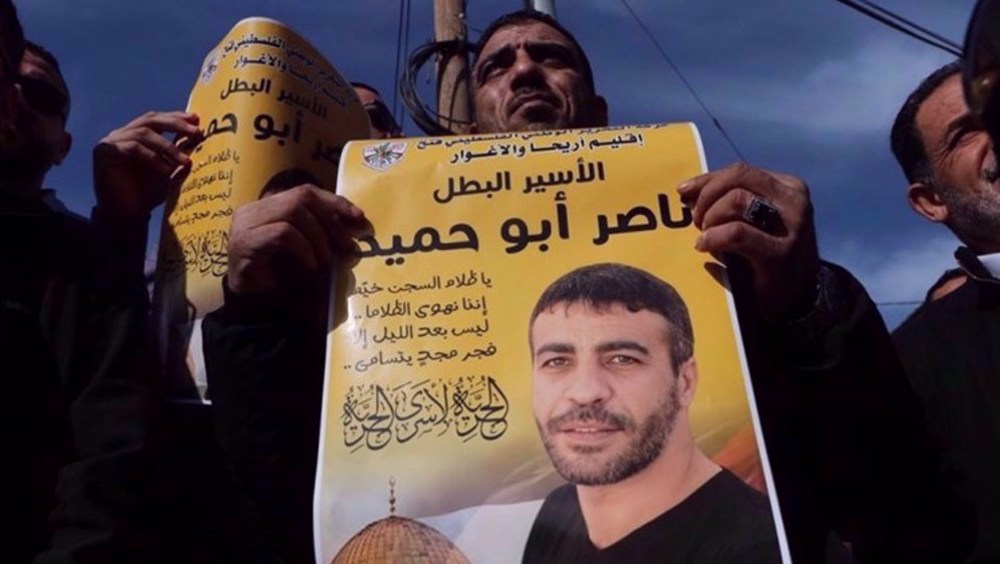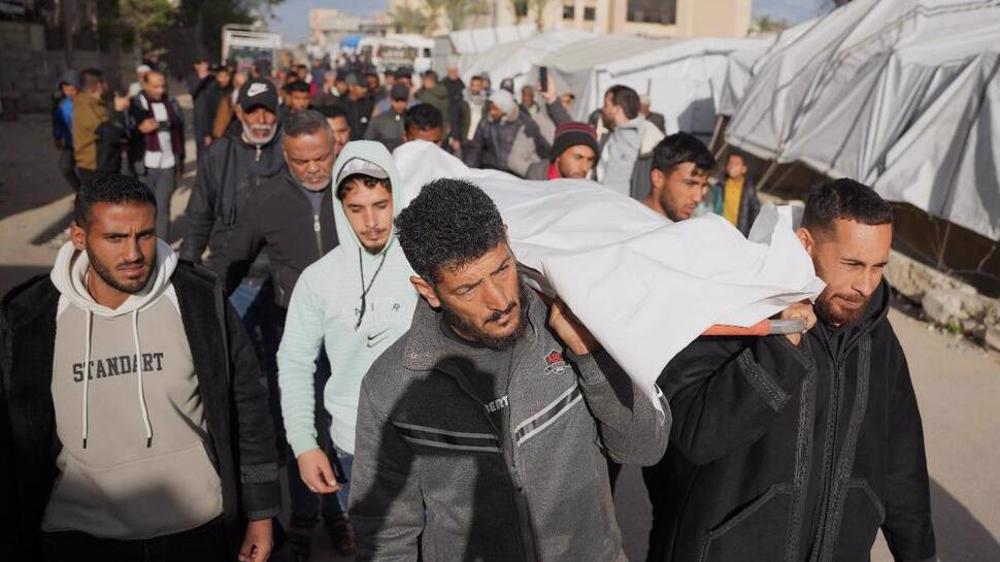Palestinians hold mass rallies in Gaza, West Bank to demand release of martyrs’ bodies withheld by Israel
Hundreds of Palestinian people have staged demonstrations in the occupied West Bank and the besieged Gaza Strip to demand the release of bodies of Palestinians killed and withheld by the Israeli regime’s forces.
The Palestinian Ma'an news agency said the demonstrators in Gaza City participated in a march on Tuesday and called for the release of the body of cancer-stricken prisoner Nasser Abu Hamid, who was declared dead last week after wrestling with cancer in Israeli jails since August 2021.
The participants carried a symbolic coffin adorned with a picture of Abu Hamid from the Red Cross office to the United Nations headquarters in Gaza, demanding that the world body play a role in securing the release of the bodies of Palestinian martyrs.
The demonstrators chanted slogans condemning the Israeli move that deprives the mothers of the martyrs from bidding farewell to their children.
"It is the right of every mother to embrace her son, bid him farewell and bury him," Abu Hamid’s mother said as she attended the march demanding the release of bodies held by the occupation regime.
"I am here for Nasser's body and the bodies of all the detained martyrs, to honor them with burial in the land of Palestine, which sacrificed their lives for the sake of its freedom and independence," she added, stressing the importance of resistance and forcing the occupation to acquiesce in the demand to hand over the bodies of the martyrs.
"من حق كل أم تحضن ابنها وتودعه وتدفنه".
— وكالة شهاب للأنباء (@ShehabAgency) December 27, 2022
والدة القائد الراحل ناصر أبو حميد من المسيرة المطالبة بالجثامين المحتجزة لدى الاحتلال. pic.twitter.com/jMeTpDcUPx
In an interview with Ma'an news agency, Abdel Nasser Farwana, head of the Studies and Documentation Unit at the Commission for Detainees and Ex-Prisoners Affairs, said the Israeli regime fears Palestinian martyrs even after their death and withholds their bodies as a collective punishment for their families.
"More than 370 bodies of martyrs are still being held in the number cemeteries in separate years and in different circumstances, including 11 bodies of prisoners who were martyred inside the occupation prisons, the last of which is the heroic prisoner Nasser Abu Hamid," Farwana said.
“What is required today from human rights and international institutions is to release the bodies of the martyrs, especially the prisoner Abu Hamid, who suffered the scourge of arrest and illness until he was martyred in captivity,” he added.
Also on Tuesday, Palestine's official WAFA news agency reported that a march of hundreds of Palestinians was held from al-Amari refugee camp to Qalandia checkpoint in the south of the West Bank city of Ramallah.
“Several hundred Palestinians heeded calls to gather at Amari refugee camp, home of Nasser Abu Hamid who died while incarcerated in Israeli prisons last week following a year-long battle against cancer but whose body was kept by the army, and then marched to the Israeli army-manned checkpoint between Ramallah and Jerusalem [al-Quds] in order to demand the return of the body of Abu Hamid and dozens of other Palestinians withheld by Israel for several months and years,” WAFA said.
The news agency added that the march was, however, crushed as soon as it arrived at the Qalandia checkpoint, with the Israeli forces firing tear gas canisters that caused suffocation for the Palestinian demonstrators.
The Palestine Red Crescent Society in Ramallah reported 11 injuries, including one with explosive bullets, during the confrontations with the occupation at Qalandia checkpoint.
Palestinian people have been holding protests throughout the West Bank and the Besieged Gaza Strip, demanding that Israel release the withheld bodies of Palestinian martyrs so that their families can bid them farewell and bury them in proper cemeteries.
In 2020, Israel approved a policy of keeping all the bodies of Palestinian prisoners who may have committed attacks against Israel, to use as leverage if Israeli soldiers were captured dead or alive.
The practice has long been a source of pain for Palestinian families, who sometimes have to wait years before receiving the body of a loved one for burial.
The policy contravenes international law, with the Geneva Convention stating that parties of an armed conflict must bury each other's dead honorably, "according to the rites of the religion to which they belonged
Israeli keeps killing more Palestinian civilians in Gaza amid relentless ceasefire violations
Aliyev: Azerbaijani territory will not be used for threats against Iran
Turkey arrests two on charges of spying for Israeli regime
Iran FM declares ‘good start’ as US–Iran talks conclude in Muscat
Iran strongly condemns 'terrorist' mosque blast in Islamabad
Iran enters talks backed by national power, popular support: MP
France, UK involved in assassination of Muammar Gaddafi's son: Reports
Shia mosque explosion in Islamabad kills more than 30, injures over 160











 This makes it easy to access the Press TV website
This makes it easy to access the Press TV website